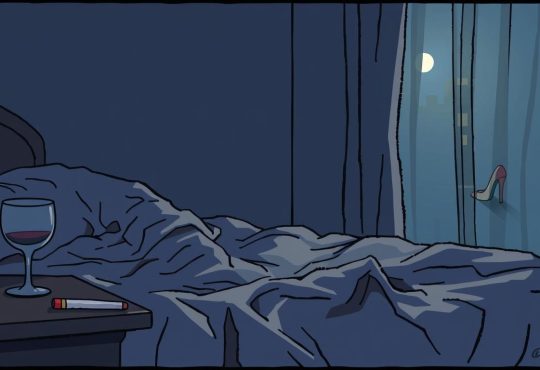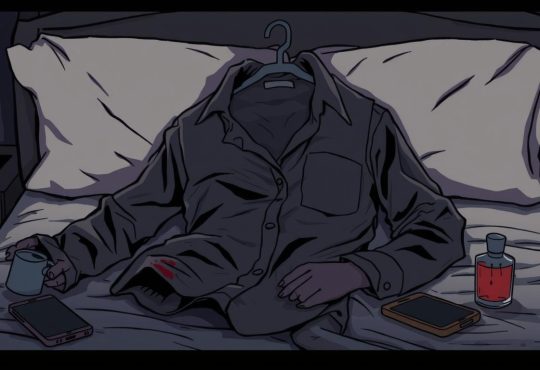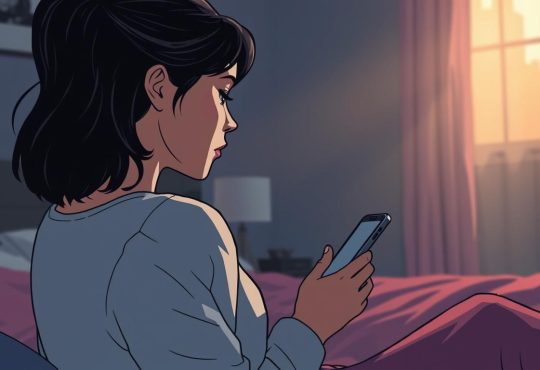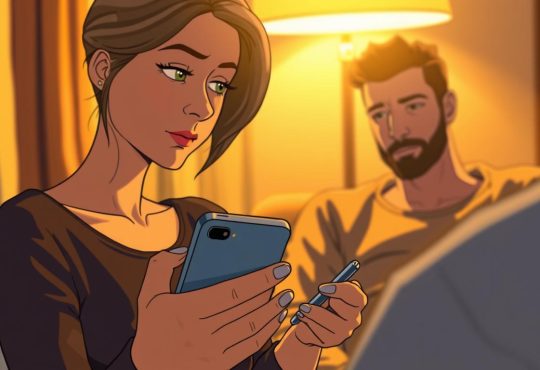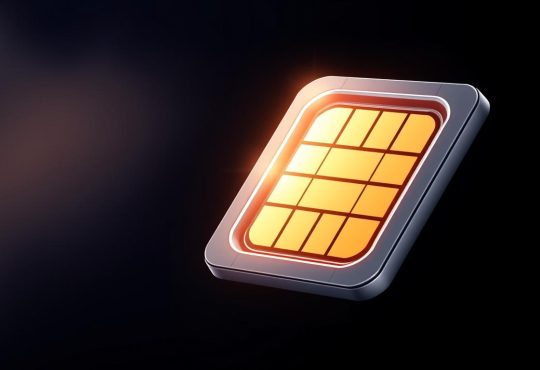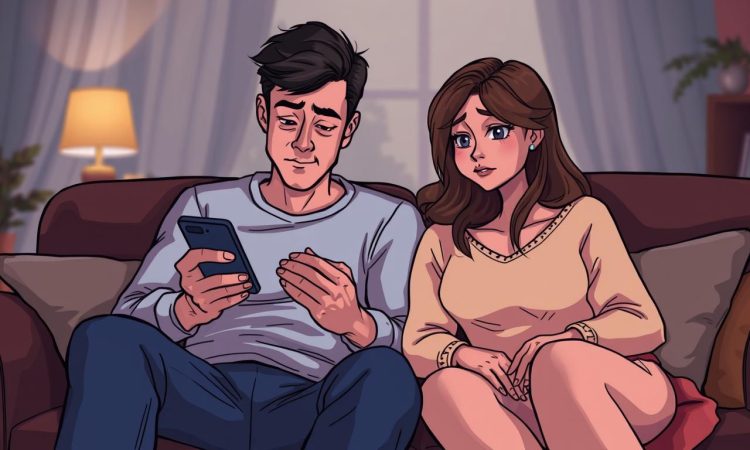
Does it feel like your partner is more connected to their phone than to you? You’re not alone. Social media, especially Facebook, has become a big part of our daily lives. But when does it start to affect a relationship?
Many couples face this issue. One person might scroll through posts while the other waits for attention. It can feel frustrating, even lonely. Experts say this doesn’t mean your partner cares less. It’s often about finding balance in a digital world.
We’ve heard stories from people who feel ignored during dinner or movie nights. They wonder if their partner is more interested in comments and likes than in them. But the truth is, social media habits don’t always reflect deeper feelings.
In this article, we’ll explore why this happens and how to address it. We’ll share tips to help you and your partner connect better. Let’s dive into understanding the role of social media in modern relationships.
On this Page:
- 1 Understanding Social Media’s Role in Modern Relationships
- 2 Examining the Impact on Attention and Connection
- 3 My Boyfriend Is Always on Facebook: In-Depth Look
- 4 Digital Addiction and Its Effects on Relationship Dynamics
- 5 Navigating Communication and Setting Boundaries
- 6 Balancing Work, Social Life, and Digital Distractions
- 7 Expert Opinions and Personal Narratives
- 8 Tips for Managing Social Media in Relationships
- 9 Conclusion
Understanding Social Media’s Role in Modern Relationships
Modern relationships are deeply influenced by the digital tools we use daily. Platforms like Facebook have reshaped how we communicate and connect. What once required a phone call or face-to-face meeting now happens with a quick message or comment.
In the past, staying connected meant spending quality time together. Today, it often involves liking a post or sending a text. This shift has changed expectations in relationships. Many people now expect instant responses and constant updates from their partner.
Notifications and ‘likes’ can feel like connection, but they don’t always lead to meaningful conversations. Research shows that 51% of partnered adults feel their partner is distracted by their phone during conversations. This highlights the challenge of balancing online engagement with genuine connection.
Social media can also lead to misunderstandings. A comment or post might be misinterpreted, causing unnecessary tension. Studies reveal that 23% of people feel jealous or unsure about their relationship due to their partner’s online interactions.
Understanding the role of social media is key to setting realistic expectations. Both partners need to navigate this digital terrain with empathy and open dialogue. By doing so, they can find a balance that works for their relationship.
Examining the Impact on Attention and Connection
In today’s digital world, it’s easy to feel like your partner’s attention is divided. Social media platforms like Facebook often pull focus away from meaningful moments. This can leave one person feeling sidelined, even when physically together.
Feeling Unappreciated in the Digital Era
Constant phone-checking during conversations can make you feel unappreciated. Imagine sharing a story, only to notice your partner scrolling through posts. This behavior can lead to feelings of neglect and frustration.
Research shows that 51% of partnered adults feel their partner is distracted by their phone during conversations. This highlights how digital habits can disrupt emotional connection. Over time, these small moments add up, creating a sense of distance.
The Loss of In-Person Connection
Face-to-face interaction is crucial for intimacy. When social media replaces genuine conversation, it can weaken the bond between partners. Missing key moments, like during meals or date nights, can have long-term effects.
Studies reveal that excessive social media use is linked to increased jealousy and relationship dissatisfaction. Couples who prioritize online validation over in-person attention often struggle to maintain closeness. Recognizing this dynamic is the first step toward addressing the issue.
By understanding the impact of digital distractions, partners can work together to rebuild their connection. Open communication and mutual effort are key to finding balance in a digital world.
My Boyfriend Is Always on Facebook: In-Depth Look
When does scrolling through posts start to overshadow meaningful moments? For many couples, this question hits close to home. Social media, especially Facebook, can become a source of tension when one partner feels neglected.
Take Sarah and John, for example. Sarah noticed John checking Facebook during dinner, movie nights, and even important conversations. At first, she brushed it off as a harmless habit. Over time, it began to feel like a barrier between them.
This isn’t just about routine checking. Compulsive behavior can make it hard to disconnect. Studies show that 70% of adults feel social media negatively impacts their relationships. For Sarah, it wasn’t just about the time spent online—it was the feeling of being second to a screen.
On the other hand, John didn’t see it as neglect. For him, scrolling was a way to unwind after a long day. This disconnect highlights the importance of understanding both sides. Open dialogue can help clarify intentions and reduce misunderstandings.
Trust and connectedness are often at stake. When one partner feels ignored, it can lead to doubts about the relationship. Small actions, like putting the phone down during quality time, can make a big difference.
By addressing these issues together, couples can find a balance that works for both. It’s not about giving up social media—it’s about prioritizing the relationship over the screen.
Digital Addiction and Its Effects on Relationship Dynamics
Have you ever felt like your partner’s screen time is taking over your relationship? Digital addiction, especially to platforms like Facebook, can subtly shift the dynamics between partners. It’s not just about the hours spent online but how it impacts shared moments and emotional connection.
Recognizing Signs of Facebook Overuse
How do you know if social media use has crossed into overuse? Signs include constant phone-checking during conversations, prioritizing posts over quality time, and feeling restless when offline. These behaviors can create emotional distance and leave one partner feeling neglected.
For example, if your partner scrolls through Facebook during dinner or movie nights, it might indicate a deeper issue. Studies show that 70% of adults feel social media negatively impacts their relationships. Recognizing these signs is the first step toward addressing the problem.
When Social Media Becomes a Distraction
Social media distractions can interfere with meaningful moments. Notifications and updates often pull attention away from in-person interactions. Over time, this can weaken the bond between partners and lead to feelings of frustration or jealousy.
Experts suggest that overuse is rarely intentional. It’s often a habit formed over time. However, addressing it requires open communication and mutual effort. Setting boundaries, like designated screen-free times, can help rebuild connection.
By understanding the impact of digital addiction, couples can take steps to prioritize their relationship. It’s about finding balance and ensuring that social media enhances, rather than hinders, their connection.
Finding balance in a digital relationship starts with clear communication. When social media habits affect intimacy, open dialogue becomes essential. It’s not about blaming but understanding each other’s needs.
Expressing Feelings Without Judgment
Start by sharing how you feel without placing blame. Use “I” statements like, “I feel disconnected when we’re on our phones during dinner.” This approach encourages understanding rather than defensiveness.
Experts suggest timing these conversations when both partners are calm. Avoid bringing it up during moments of frustration. Instead, choose a neutral time to discuss your concerns.
Establishing Mutual Digital Guidelines
Set clear boundaries together. For example, agree on specific times to put phones away, like during meals or date nights. This creates space for meaningful connection.
Consider setting up technology-free zones in your home, such as the bedroom or dining area. These small changes can make a big difference in your relationship.
Remember, boundaries are a shared responsibility. Both partners should feel comfortable discussing and adjusting them as needed. This fosters trust and respect.
By prioritizing open communication and mutual guidelines, you can strengthen your bond. It’s about finding balance in a digital world while nurturing your connection.
Balancing Work, Social Life, and Digital Distractions
Juggling work, social life, and digital distractions can feel overwhelming. In today’s fast-paced world, it’s easy to let screens take over both personal and professional spaces. Whether it’s checking notifications during meetings or scrolling through social media at dinner, these habits can disrupt focus and connection.
Digital distractions don’t just affect productivity at work. They can spill over into personal relationships, creating tension and misunderstandings. For example, a partner might feel ignored if the other is constantly on their phone. Similarly, colleagues may notice a lack of engagement during team discussions.
Managing Office Crushes and Professional Boundaries
Office dynamics can become complicated when personal feelings mix with professional responsibilities. A crush on a coworker, combined with social media interactions, can blur boundaries. It’s important to maintain professionalism while navigating these situations.
Setting clear boundaries is key. Avoid oversharing personal details online or engaging in excessive messaging with colleagues. This helps maintain a respectful and focused work environment.
Communication is equally important. If digital habits are affecting your work or relationships, address them openly. Discussing expectations and finding common ground can help create a healthier balance.
By managing digital distractions and setting boundaries, you can improve both your work performance and personal connections. It’s about finding harmony in a world where screens are always present.
Expert Opinions and Personal Narratives
What do experts say about the role of social media in relationships? Professionals like Louanne Ward emphasize that constant digital engagement can be a red flag. It often signals a lack of undivided attention, which is crucial for maintaining a strong connection.
Ward explains, “When one partner prioritizes their screen over quality time, it can create emotional distance.” This sentiment is echoed by many relationship experts who stress the importance of being present in the moment.
Insights from Relationship Experts
Experts agree that undivided attention fosters intimacy. When social media takes precedence, it can lead to feelings of neglect. Studies show that 70% of adults feel their relationships are negatively impacted by excessive screen time.
Ward suggests setting clear boundaries. “Designate screen-free times to focus on each other,” she advises. This approach helps rebuild connection and ensures that both partners feel valued.
Real-Life Stories and Experiences
Real-life examples highlight the diverse impact of digital habits. One couple shared how constant Facebook scrolling during dinner led to frustration. The partner felt ignored, while the other saw it as a way to unwind.
Another story involves a couple who overcame digital distractions by setting mutual guidelines. They agreed to put phones away during meals and date nights. This small change strengthened their bond and improved communication.
These narratives show that every relationship is unique. While some partners feel disrespected by excessive social media use, others remain indifferent. Understanding these differences is key to finding balance.
By reflecting on expert insights and personal stories, readers can assess their own situations. Open dialogue and mutual effort are essential for navigating the challenges of a digital world.
Tips for Managing Social Media in Relationships
Balancing social media and personal connection can strengthen your bond. While platforms like Facebook keep us connected, they can also create distance if not managed well. The key is to find a healthy balance that works for both partners.
Implementing Digital Detox Strategies
Start by setting clear boundaries for screen time. Designate specific hours or zones in your home where phones are off-limits. For example, make the dining table a tech-free area to focus on meaningful conversations.
Another effective strategy is to schedule regular digital detox days. Spend these days engaging in offline activities like hiking, cooking, or reading together. These moments help you reconnect without distractions.
Rediscovering Offline Moments
Rediscover the joy of offline activities that nurture intimacy. Play board games, take a walk, or try a new hobby together. These shared experiences create lasting memories and deepen your connection.
Experts suggest that small shifts in routine can lead to significant improvements in relationship satisfaction. By prioritizing offline moments, you can rebuild emotional closeness and reduce dependency on social media.
Remember, managing social media in your relationship isn’t about giving it up entirely. It’s about finding a balance that allows you to stay connected while nurturing your bond. Start with these tips and watch your relationship thrive.
Conclusion
Navigating the digital landscape in a relationship can be challenging. Social media’s impact on connection is undeniable, but it doesn’t have to weaken your bond. By prioritizing open communication, setting clear boundaries, and fostering mutual understanding, couples can manage digital distractions effectively.
Expert insights and real-life experiences show that balance is achievable. Small changes, like designated screen-free times, can make a big difference. It’s about finding harmony between online engagement and in-person moments.
We encourage you to reflect on your habits and consider adjustments for a healthier relationship. Revisit the practical tips shared earlier to solidify steps toward improvement. Every couple has the potential to thrive in a digital world by prioritizing their connection.
With effort and understanding, you can create a relationship that’s stronger, both online and offline.



